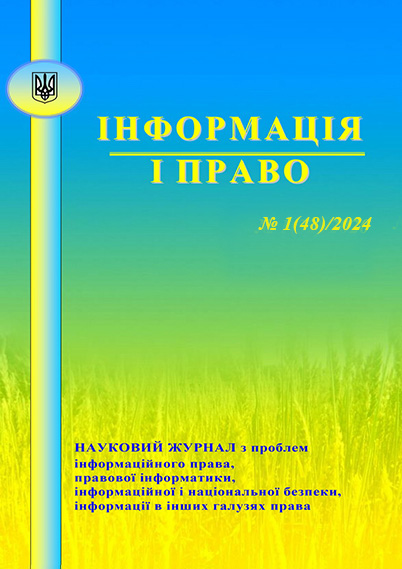Екзистенційність визначення парадигми правового регулювання застосування штучного інтелекту
(частина 1)
DOI:
https://doi.org/10.37750/2616-6798.2024.1(48).300700Ключові слова:
штучний інтелект, генеративний, право, врядування, управління, сингулярність, ризикиАнотація
Стаття присвячена проблемам правового регулювання та застосування технологій штучного інтелекту у світі та в Україні. Здійснено огляд основних міжнародних та національних ініціатив, спрямованих на вирішення проблеми формування стійкого врядування та регулювання розвитку і застосування технологій штучного інтелекту, а також висвітлені результати обговорення можливостей штучного інтелекту та ризиків внаслідок його застосування для миру та безпеки, економіки та суспільства, прав людини. Отримані результати аналізу сучасного стану справ у сфері штучного інтелекту. Спостерігається невизначеність, розбіжність поглядів політичних, інтелектуальних та бізнес-еліт як на національному, так і на глобальному рівні щодо концептуального змісту подальших шляхів щодо визначення правового регулювання штучного інтелекту. Світ зіткнувся з феноменом сингулярності, що вимагає визначення нової парадигми та концептуальних засад трансформації правових систем, перш за все, нормативно-правової бази для ефективної розробки та застосування технологій штучного інтелекту.
Посилання
AI HLEG. (2019). Ethics guidelines for trustworthy AI. High-level expert group on artificial intelligence: 6.
AIGA. (2024). Generative AI Governance: Shaping a Collective Global Future. Report. World Economic Forum.
Aixploria. (2024). AI Tools Directory. Retrieved from https://www.aixploria.com/en
ASG. (2024). AI Decrypted: A Guide for Navigating AI Developments in 2024. Report: January 24, 2024.
Cazzaniga, M., et al. (2024). Gen-AI: Artificial Intelligence and the Future of Work. Staff Discussion Notes, 2024(001).
Coraggio, G. (2023). What Legal Challenges in Harnessing Generative Artificial Intelligence? Retrieved from https://www.linkedin.com/pulse/what-legal-challenges-harnessing-generative-giulio-corag gio
Corfman, T. (2023). The legal risks of ChatGPT. Retrieved from https://www.ragan.com/the-legal-risks-of-chatgpt
Daugherty, P. at el. (2024). AI Governance Alliance Briefing. Paper Series. World Economic Forum.
Dia, H. at el. (2021). Artificial Intelligence Tests for Certification of Autonomous Vehicles.
Dictionary.com. (2019). Why “Existential” Was Dictionary.com’s 2019 Word Of The Year.
Digwatch. (2024). Global Digital Compact. Retrieved from https://dig.watch/processes/glo bal-digital-compact
Dörffel, C. & Schuhmann, S. (2022). What is inclusive development? Introducing the multi dimensional inclusiveness index. Social Indicators Research, 162(3), 1117-1148.
Eeconomic Times. (2024). Davos 2024: Top quotes from tech world’s leading minds on artificial intelligence.
European Commission. (2019). Ethics guidelines for trustworthy AI. Retrieved from https://digital-strategy.ec.europa.eu/en/library/ethics-guidelines-trustworthy-ai
European Commission. (2023). G7 Leaders’ Statement on the Hiroshima AI Process. 30 October 2023.
European Commission. (2024). European AI Alliance. Retrieved from https://ec.europa.eu/ futurium/en/eu-ai-alliance.html
Flannigan, A. (2023). Legal and ethical issues with the use of AI – including ChatGPT – in healthcare. Internet Law Bulletin, 25 9.
GOVUK. (2023). The Bletchley Declaration by Countries Attending the AI Safety Summit, 1-2 November 2023.
Gupta, J., & C. Vegelin (2023). Inclusive development, leaving no one behind, justice and the sustainable development goals. International Environmental Agreements: Politics, Law and Economics, 1-7.
Guterres, A. (2023). Secretary-General's video message to the AI for Good Global Summit. Geneva, Switzerland. Retrieved from https://www.un.org/sg/en/content/sg/statement/2023-07-06/sec retary-generals-video-message-the-ai-for-good-global-summit-%C2%A0
Harris, K. (2023). Remarks by Vice President Harris on the Future of Artificial Intelligence. London, United Kingdom. Retrieved from https://www.whitehouse.gov/briefing-room/speeches-rem arks/2023/11/01/remarks-by-vice-president-harris-on-the-future-of-artificial-intelligence-london-united-kingdom
Hillemann, D. (2023). Auto-GPT: Unleashing a Legal Pandora’s Box? Medium.
Hustler, М. (2023). The Beginning of Chat GPT? Medium.
ITU. (2023). AI for Good Global Summit. Retrieved from https://aiforgood.itu.int/summit23
Kurbalija, J. (2024). 12 AI and Digital Predictions for 2024. Retrieved from https://www. diplomacy.edu/blog/12-ai-and-digital-predictions-for-2024
Jyoti, R. and D. Schubmehl. (2023). The Business Opportunity of AI. IDC. Retrieved from https://blogs.microsoft.com/blog/2023/11/02/new-study-validates-the-business-value-and-opportunity-of-ai
Li, C. (2024). AI Governance Alliance unveils inaugural report on equitable AI strategies. Retrieved from https://www.weforum.org/agenda/2024/01/ai-governance-alliance-debut-report-equitable-ai-advancement
Lohr,C. (2023). GPT-4 Python & Tkinter GUI Desktop Application. GitHub, Jun 2, 2023. Retrieved from https://github.com/cmlohr/GUI-gpt-4
NATO. (2024). NATO releases first ever quantum strategy. Retrieved from https://www. nato.int/cps/en/natohq/news_221601.htm#:~:text=The%20strategy%20outlines%20how%20quantumco mmunications%20using%20quantum%20resistant%20cryptography
NATO. (2024). Summary of NATO’s Quantum Technologies Strategy. Retrieved from https://www.nato.int/cps/en/natohq/official_texts_221777.htm
NATO. (2023). NATO starts work on Artificial Intelligence certification standard. Retrieved from https://www.nato.int/cps/en/natohq/news_211498.htm
NIST. (2023). Artificial Intelligence Risk ManagementFramework (AI RMF 1.0).
Perlman, A. (2022). The implications of ChatGPT for legal services and society. Available at SSRN 4294197.
Perreard, J. (2024). Generative AI regulation dominates the conversation at Davos. Retrieved from https://asia.nikkei.com/Spotlight/Davos-2024/Generative-AI-regulation-dominates-the-conversation -at-Davos
Pomeroy, R. and J. (2024). MyersAI – artificial intelligence – at Davos 2024: What to know. World Economic Forum. Retrieved from https://www.weforum.org/agenda/2024/01/artificial-intellig ence-ai-innovation-technology-davos-2024
Ruggeri, A. (2024). Davos 2024: Can – and should – leaders aim to regulate AI directly? BBC Work life. Retrieved from https://www.bbc.com/worklife/article/20240118-davos-2024-can-and -should-leaders-aim-to-regulate-ai-directly
Sussman N., N. Norlen and G. Barrett (2023). The Dictionary.com Word of the Year is hallucinate. Retrieved from https://content.dictionary.com/word-of-the-year-2023/?fbclid=IwAR159-04iAvlR2c109OOM2Wss6yJN9HSlgl1POWgIvqAm802UyHhcPIst4Y
Torkington., S. (2024). These are the 3 biggest emerging risks the world is facing. World economic forum. Retrieved from https://www.weforum.org/agenda/2024/01/ai-disinformation-global-risks
UN Security Council. (2023). Artificial Intelligence: High-level Briefing. Retrieved from https://www.securitycouncilreport.org/whatsinblue/2023/07/artificial-intelligence-briefing.php
UN Security Council. (2023). Secretary-General’s press conference launching High-Level Advisory Body on Artificial Intelligence. Retrieved from https://www.un.org/techenvoy/ai-advisory-body
UN. (2023) AI Advisory Body. Governing AI for Humanity. Interim Report. Retrieved from http://www.un.org/en/ai-advisory-body
UN. (2024). Concluding session of the Ad Hoc Committee 29 January – 9 February 2024. New York.
UN. (2024). The UN’s role in setting international rules on AI. Retrieved from https://news. un.org/en/interview/2024/01/1145192
UN. (2024). Global Digital Compact. Retrieved from https://www.un.org/techenvoy/global-digital-compact
Watch, A.I. (2021). National strategies on Artificial Intelligence: A European perspective. JRC-OECD report.
WEF. (2024). AI and Digital. WEF 2024 in Davos. Retrieved from https://dig.watch/event/ world-economic-forum-annual-meeting-2024
White House. (2023). Executive Order on the Safe, Secure, and Trustwor thy Development and Use of Artificial Intelligence. Presidential actions.
White, K. and N. Sen. (2024). Initiatives Lead Generative AI risks: How can chief legal officers tackle them? World economic forum.
Whiting, K. (2024). From Sam Altman to António Guterres: Here's what 10 leaders said about AI at Davos 2024. World Economic Forum logo. Retrieved from https://www.weforum.org/ agenda/2024/01/what-leaders-said-about-ai-at-davos-2024
Woods-Moss, J. (2024). Davos 2024: An exciting week for Artificial Intelligenceenthusia sts. Retrieved from https://www.linkedin.com/pulse/davos-2024-exciting-week-artificial-intelligence-julie-woods-moss-cl8pe
Ye, Josh. (2024).China issues draft guidelines for standardising AI industry. Retrieved from https://www.reuters.com/technology/china-issues-draft-guidelines-standardising-ai-industry-2024-01-17
Баранов, О. (2022). Трансформація: соціальна & цифрова & правова : монографія у 3-х т. Т. 1. Порятунок цивілізації: економіка результату. Одеса: Видавничий дім “Гельветика”.
Баранов, О. (2023). Трансформація правових систем – засаднича умова сталого розвитку. Інформація і право. № 2(45)/2023. С. 9-32.

